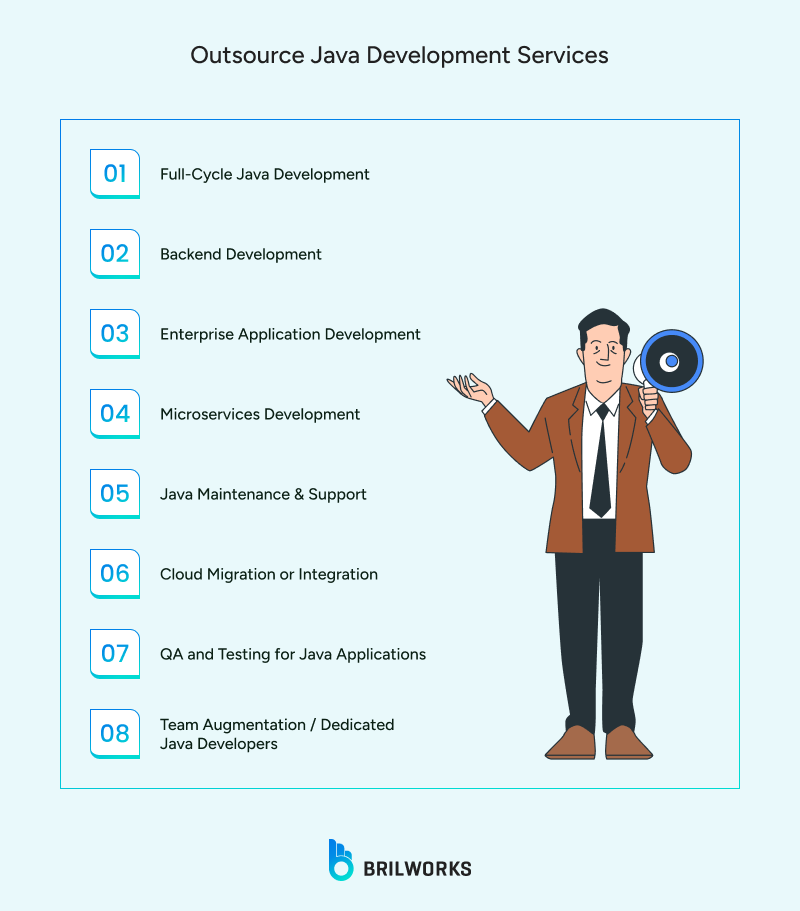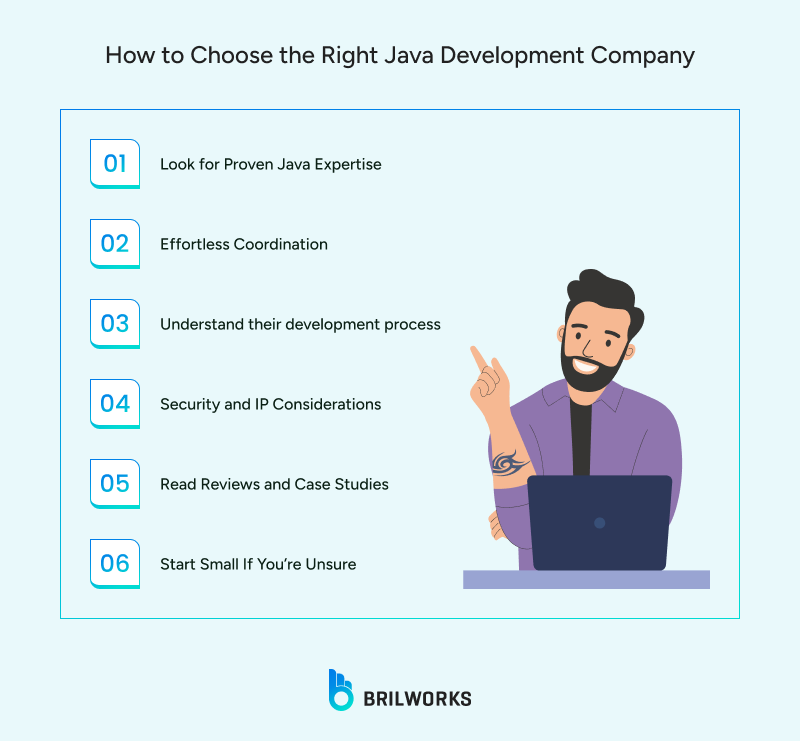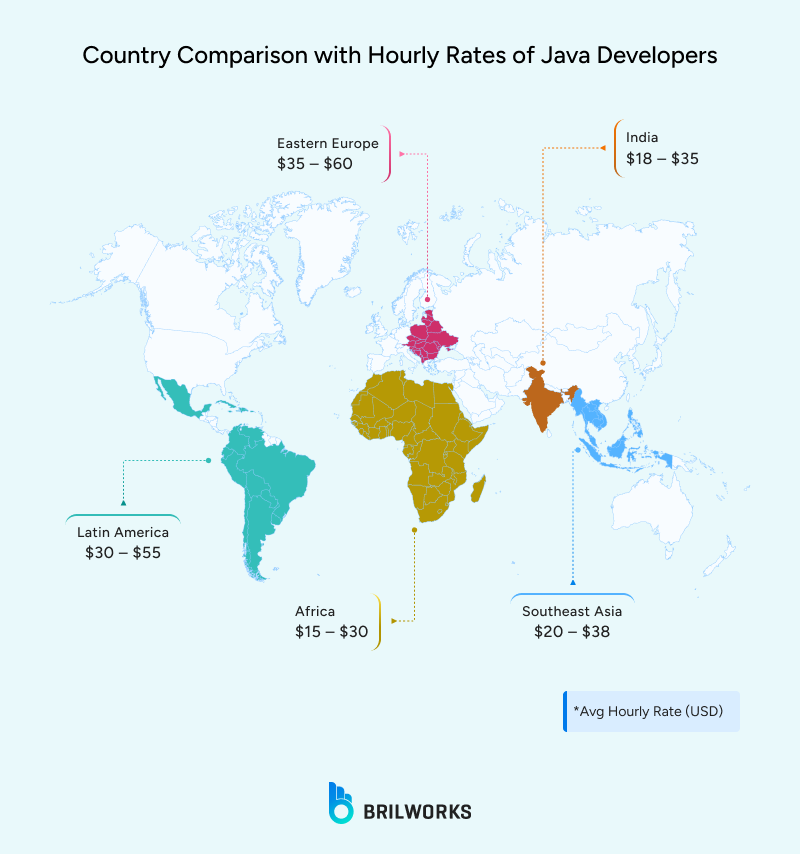COOPERATION MODEL
ARTIFICIAL INTELLIGENCE
PRODUCT ENGINEERING
DevOps & Cloud
LOW-CODE/NO-CODE DEVELOPMENT
INDUSTRY
FRONTEND DEVELOPMENT
CLOUD DEVELOPMENT
MOBILE APP DEVELOPMENT
LOW CODE/ NO CODE DEVELOPMENT
EMERGING TECHNOLOGIES








Some of the companies are still thinking twice before they outsource because of the doubt about whether it's effective or not. However, reality paints a different picture. Outsourcing IT operations like software development or mobile app development has proved to be a great business practice, helping organizations save time and money. The numbers also back this statement. The IT outsourcing market was at USD 744 billion in 2024, according to reports. And by 2030, it is expected to reach an astounding USD 1.2 trillion.
In this article, we will walk through why you should consider outsourcing Java development, which company you should partner with, and the cost of outsourcing. If you want to understand the whole dynamic of hiring Java developers then read our recent article about guide to hire Java developers.
If you’re considering ways to outsource Java development, our dedicated Java developers can help you design, build, and maintain reliable Java solutions that scale effortlessly as your business grows.

If you are already sold on Java as your tech stack, the next question is execution. How do you get the project built efficiently, affordably, and with the right expertise? These are some of the questions that companies struggle with. Here are the top reasons businesses choose to outsource:
If you decide on an internal Java team, then you may have to go through a lengthy hiring and onboarding process. Additionally, the primary drawback of having an in-house team is that it can be costly, particularly in places like Western Europe or North America. Through outsourcing, you can hire qualified developers for much less money, often without compromising on quality. When managed right, the cost of outsourcing is one of the biggest advantages.
Outsourcing connects you with top developers worldwide, many of whom specialize in Java frameworks like Spring Boot, Hibernate, and Struts. Instead of being limited to your local talent pool, you can hire for skill and experience, not just proximity.
By outsourcing your product or project reaches the market more quickly than usual. With outsourcing development, you can tap into a larger pool of skilled professionals who can work on your project simultaneously or around the clock. This reduces bottlenecks and speeds up development cycles, enabling your product to reach the market sooner and giving your business a competitive edge.
Outsourcing allows you to scale up or down in accordance with project requirements, regardless of whether you require a Java developer or a full team. For product teams and startups navigating uncertain roadmaps, this is extremely helpful.
The operational relief that outsourcing offers is one of its underappreciated advantages. Your internal team can concentrate on strategy, user growth, and product-market fit by outsourcing day-to-day technical management to a reputable Java development company.

You understood why you should outsource now let’s talk about what development processes you should outsource. Java development companies offer various outsourcing services that you can choose based on your project needs.
Here’s a breakdown of Java development services companies commonly outsource:
You can hand over your entire product development to your chosen Java development company. They does the entire process from discovery and architecture to launch and maintenance support. It's very ideal when you don't have an internal dev or want to fast-track delivery without building one.
Java is widely used for building scalable, secure server-side systems. You can outsource backend architecture, API development, database integration, and cloud services while keeping your frontend in-house if needed.
Large organizations often outsource the development of internal tools, ERPs, or legacy system modernization — especially when Java-based technologies (like Hibernate, Spring, or Java EE) are involved.
Many companies use outsourcing partners to help break monolithic systems into Java-based microservices. It's a good way to scale functionality without overloading internal teams.
Once your application is live, outsourcing bug fixes, performance optimization, security patches, and feature updates can keep your system healthy without pulling focus from core business goals. Furthermore, they can also keep updating the application as new Java versions are released.
Migrating Java applications to cloud platforms like AWS, Azure, or GCP can be complex. Outsourcing this phase to experts helps ensure smooth, cost-effective transitions.
Testing is often overlooked — or under-resourced. You can outsource test automation, unit testing, integration testing, and performance testing for your Java systems.
You can hire 1–3 Java developers to work alongside your internal team as an extension, often referred to as “team augmentation” or “staff augmentation.”
Also read: Choosing the best hiring model for Java development

By now, you might have understood about how Java outsourcing works. Now let's move to the most important step of the process which is how to choose the right Java development company. However, if you start searching for a partner with a focus on big names or low rates, you risk undermining your project before it starts. Your focus should be on finding the right team that understands what you are building, why it matters, and how to execute it.
Here are a few things worth paying attention to:
First and foremost, they should be proficient in what they do. Not just with basic language and rules but in depth they should be well aware of how to use Java efficiently. Every company has its portfolio page linked, be sure to review it. For analyses, you can look for what technologies they use that are associated with Java development. Are they familiar with Java frameworks like Spring Boot, Hibernate, or JSP? A reputable Java development company would have noted everything down in their portfolio section with real-world results.
This one is important. When you partner with the company, they might be offshore, and that’s the case most of the time. Most of the outsourcing companies are located in different time zones, on different continents. This creates a friction of time, that’s why streamlined communication is important. Communication is important because you need to be aware of the progress or if any challenges have occurred. So, when you first contact them, notice how they communicate in the early conversations, which will usually reflect how they will work later.
You may be familiar with various development methodologies. For example, at Brilworks, we use Agile methodology for development processes, others might use different approaches like Scrum or Kanban. Everyone says that they use these methodologies. That’s not the point. What matters is how they plan, deliver, and respond when things shift (because they will). Ask how they handle code reviews, testing, and change requests. Look for structure that still leaves room for flexibility.
If you’re handing over sensitive information or core product logic, you need to know it’s protected. Reputable teams will have NDAs, access control policies, and clear terms about code ownership. If it’s vague, ask more questions.
Look for client testimonials, case studies, or references. Genuine feedback from past clients can reveal how the company handles pressure, meets deadlines, and responds to issues. Just Google the company name and you will get reviews too.
If you’re unsure, test the waters with a small, well-defined pilot project. It’s a low-risk way to gauge the team’s technical abilities, communication, and delivery quality before committing to a long-term engagement.
The country you choose can influence everything from code quality to communication speed. Here’s a look at some of the most reliable regions for Java development outsourcing:
India continues to be a top destination for outsourcing Java development. The country has a vast pool of experienced Java developers, many of whom specialize in enterprise-grade solutions using Java frameworks like Spring and Hibernate. Cost remains a major advantage, and many firms here are process-driven, have mature delivery models, and are used to working with international clients.
Countries like Poland and Ukraine have strong technical universities and a growing number of Java-focused firms. Developers here tend to be well-versed in backend development, system architecture, and scalable solutions. English proficiency is high, and work culture is often more aligned with Western expectations. Rates are higher than in India or Southeast Asia, but many companies find the trade-off worth it.
For U.S.-based companies, Latin America offers the benefit of proximity and time zone compatibility. Java development outsourcing in this region is gaining momentum, especially in Mexico and Argentina, where there’s a growing tech ecosystem and solid English fluency. While costs can be higher compared to Asia, the ability to collaborate in real time — without the late-night meetings — is a major plus.
Vietnam is emerging as a strong contender in the outsourcing space. It offers skilled Java developers, competitive pricing, and a growing number of software firms with international experience. The Philippines, while traditionally known for BPO services, also has a tech workforce that’s steadily moving into software development.


If outsourcing is done carefully, it can yield significant benefits. Many teams rush into outsourcing Java development without a clear structure or with irrational expectations, and they pay for it later in the form of misaligned results, technical debt, or delays.
Here are some of the most common (and avoidable) mistakes:
When comparing hourly rates across regions, it can be tempting to accept the lowest bid. However, less expensive does not always equate to superior or even adequate. Later on, you might have to deal with expensive rework, inadequate documentation, or bad code. Cost should always be weighed against process maturity, communication, and experience.
Ambiguity causes misalignment. Even a talented team will find it difficult to provide what you truly require if your scope, features, or expectations are not well defined. Uncertainty in the brief can lead to scope creep, overspending, and frequent requests for changes.
Ineffective communication can sabotage development, even with skilled developers. Delays and unmet expectations may result from time zone differences, unclear project ownership, or language barriers. Verify that the company's working methods, such as how updates are tracked, who you will communicate with, and how frequently you will sync, match your own.
Java is not the sole focus of all software development firms. While some may list it among dozens of technologies, they are not really knowledgeable about Java-based microservices, Spring Boot, or enterprise Java applications. Request portfolios, case studies, or developer profiles that are specific to Java at all times.
Jumping into a 6-month contract without first testing the waters is risky. Before committing to a larger project, a quick trial project, discovery phase, or even a code audit can help evaluate their capabilities.
The goal of outsourcing is frequently short-term delivery. However, what occurs following launch? Your internal team or potential vendors may find it difficult to scale or maintain the code if it is poorly organised and documented. Early on, talk about support, handover procedures, and documentation.
As a seasoned Java development company, we’ve worked with startups, growing businesses, and enterprise clients across industries. From backend systems and microservices to cloud-based apps and long-term support, our developers bring deep expertise and clean execution to every project.
When you partner with us, you get more than just code. You get:
Dedicated Resources On-Demand
Scale your team exactly when you need to — and down when you don’t.
Emergency Support
Whether it’s a bug in production or a system outage, we’ve got your back.
Scalable Projects
From MVPs to enterprise-grade systems, we match resources to your roadmap.
Quick Turnaround Time
Tight deadlines? We’re built for fast execution without sacrificing quality.
Complete Autonomy
Retain control while we handle the heavy lifting — zero micromanagement needed.
Quality Infrastructure
Our teams work in secure, high-performance environments optimized for delivery.
We work as a true extension of your internal team, focused on outcomes, not just deliverables. If you're ready to outsource Java development with clarity, flexibility, and confidence, let’s connect.
Outsourcing Java development allows you to access experienced developers quickly, reduce hiring and infrastructure costs, and scale your team as needed without long-term commitments.
Costs vary by location and expertise, but average hourly rates range from $25–$80. Eastern Europe, Asia, and LATAM offer competitive rates with solid developer quality.
You can outsource everything from backend development and enterprise app builds to cloud migration, microservices architecture, API integration, and ongoing maintenance.
Look for companies with proven Java experience, clear communication practices, client references, and flexible engagement models. A short trial or discovery phase can help evaluate fit.
Yes — if you work with a reputable company. Ensure proper NDAs are in place, check for secure infrastructure, and discuss code ownership, documentation, and handover processes up front.
Get In Touch
Contact us for your software development requirements
Get In Touch
Contact us for your software development requirements